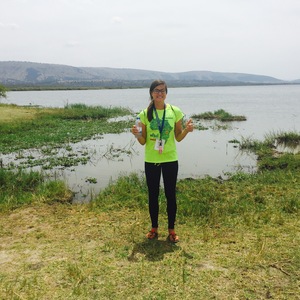By Erika Crowell, representing U.S. Department of State through WWC LLC
It's 10:30 am at the Gashora Girls Academy in Rwanda which marks the end of the first class of the day and the start of a short break for the 120 WiSci girls;
Yet there are no screeching of chairs being pulled out, rushing out of classrooms, or voices in the hallway. I peer out of the staff room commonly known as the Command Center and to my surprise they are still in class continuing to focus on building electric cars completely oblivious to the time and remaining focused. When the clock struck 10:35 and the teachers had announced break time was upon them and the girls remained with their cars I knew that the camp that we had planned with our partners was going to not only be a success but full of these surprising yet magical moments.
When I was first introduced to the idea of a girls STEAM camp back in November of 2014 with my colleagues Aldrinana Leung and Director Connie Tzioumis we had to start from scratch. We knew the location of the camp was secured and Intel would be a partner and contributor to the curriculum but details such as the number of campers or if the campers would be from one country or multiple countries was unknown.
Fast forward to July 2015 and we have a full schedule broken down to the half hour of what the girls would be doing each day for three weeks, their excursions to the Kigali Genocide Memorial, Visit to Akagera Park and a Fish Farm planned out, and girls from 9 different countries selected with their flights booked. Months of hard work couldn't have been done without our partners at The Meridian International Center, Girl Up, Intel and Microsoft. Each partner brought expertise and resources to the table that helped a loose idea for a girls STEAM camp turn into the reality WiSci 2015 has become.
Working for the Secretary's Office of Global Partnerships at the Department of State has shown me that bringing the public and private sector together is much more powerful than trying to tackle global challenges as government alone. WiSci is a true example of how bringing different entities together as a team can create something impactful and truly inspiring.
After being in the planning mindset for several months I never took the time to ponder what the girls' experience would actually be like. Questions such as: Would they get along? Would they branch out and get to know other girls from different countries? Did we pack their schedules too much? Would they feel like the camp was meaningful? swirled into my head as I was getting off of the plane with the 28 American Girls in Kigali and loading the buses to make the drive to Gashora.
Looking back I think to myself what silly questions! During Week 1, trivia night was planned and Aldrinana and I were helping the Girl Up team grade answers in the cafeteria. All of a sudden we hear shrieks and girls from different teams sprinted to the center of the room and began to dance to a song that came on our background music playlist. More and more joined in and we looked at eachother surprised and just turned up the volume and let it happen. The rest of the days the girls broke out of their country cliques and meshed together as they had during their first and definitely not last dance party.
Seeing girls from Ethiopia, the United States and Ghana puzzle together over their kudu sessions with Microsoft and brainstorming together, or hearing a girl from Nigeria comforting a girl from Uganda in a moment of homesickness, or girls in a leadership activity sharing the challenges of what it's like to be a girl in the STEAM fields coming from different countries and customs were so powerful to see and became common day to day. As I started to get to know the girls I was moved by their unstoppable drive to try to change the world with their work in the STEAM fields. These girls have goals to be the world's future neurosurgeons, bio-chemical engineers and computer scientists and to decrease the gender gap that exists in these fields.
I think at first I thought this camp would just be a cool opportunity that would take all of us to a new country and empower the girls to learn new innovative lessons from our private sector partners and afterwards they would go home after with this new knowledge; In other words I was expecting a typical camp with the focus on STEAM. We were right in some senses but didn't think about the life-long friendships that would tie girls from nine different countries together making it hard for them to leave, or discussions on how to properly implement after school clubs for girls in science, or how they would talk to each other about taking what they learned and empowering other girls to try out a subject like computer sciences or math as a career.
Gashora Girls Academy started out as a campsite for many but after cross-cultural lessons, robotics, coding, discussing the role of women in STEAM, bonding over music and their love for math over three weeks Gashora,Rwanda became a home away from home for all of us. When you bring 120 girls together from around the world and inspire them to learn and give them the freedom to create, there is no other word to describe it than magical, and I cannot be more proud to be a part of the staff to help implement WiSci 2015.
Erika Crowell is a Program Analyst in the Secretary's Office of Global Partnerships at the U.S. Department of State. For WiSci 2015 Erika was on the implementation team from the beginning and was thrilled to be there on the ground to meet the girls and see it through!
